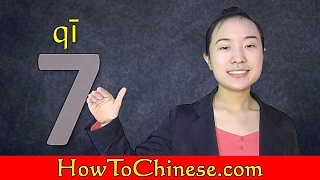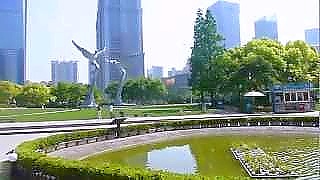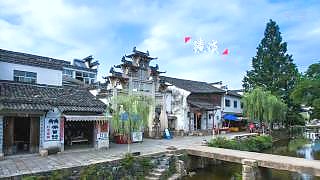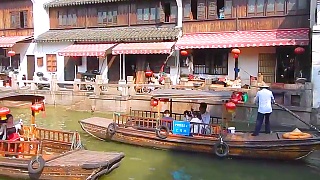PinYin - English : pronunciation.
~ is used where there are two sounds in one syllable.
Ou[ch] means use the first sound of the word 'ouch'; same sound as ow[l].
***
Greetings
Nǐ Hǎo - Hello / Hi (literally, you good?) : nee how
Zài Jiàn - Goodbye / bye : z~eye jee~ann
HuānYíng (GuāngLín) - Welcome ! (You'll often hear this when enter a restaurant)
DaJia Hao ! - Hello everybody !
***
Introductions
Nǐ - you / your : nee
Wǒ - I / my : woh
What is your name? - Nǐ jiào shénme míngzì? : Nee j~ou[ch] shen mer ming zuh?
My name is ... - Wǒ de míngzì shì ... : Woh der ming zuh sh ...
***
XièXiè - : Thanks : shee~air shee~air (second is a little softer/quieter)
XièXiè Nǐ ! - Thank you! : shee~air shee~air nee!
***
DuìBuQǐ - Excuse me / sorry : der boo chee
BúKèQì - No problem / you're welcome : boo ker chee
Mei guan xi - No problem / you're welcome : may goo~ann shee
Qǐng - Please : ching
Mei / MeiHǎo - Beautiful : may / may how
***
Interations
DuWei - That's right : doo~way (quickly, and often said twice)
Yes and no have no direct translations in Chinese, but the following will be fine is answer to common questions, although they are more like 'to be' and 'not to be' if translated literally; however, these are real colloquial uses.
Bú shì - no : boo shh
Bú shì can also be used in reply to 'Thank you !' with the meaning 'you're welcome' / 'no need to say' / 'it's nothing'
Shì de - yes : shh der
E.g. LàJiāo ? - lah jee~ou[ch] (chillies ?) : Shì de / Bú shì
***
Wǒ - I / me : woh
Nǐ - You : nee
Tā - He / she : tah
***
Shopping and restaurants
Wǒ Yào - I want / would like I would like one of these : Wǒ yào Yī ge Zhè ge (woh yow ee guh jay guh)
***
ZhèGe - This : jay guh
NàGe - That : nay guh
***
Yī Ge - One (of) : ee guh
Lian Ge - Two (of) : lee~ann guh (Two as a simple number is Er, pronounced 'are')
Sān Ge - Three (of) : san guh
***
Duō Shǎo Qián? - How much? (price) : doo~or sh~ow[l] chee~ann?
Zhège duōshǎo qián? - How much is this? : jay guh
Nàgè duōshǎo qián? - How much is that? : nay guh
Tài Guì Le! - too expensive! : tie gwee ler!
***
nǐhǎo ma? - How are you? : nee how mar ?
Hǎo De - ok : how der
Hěn Hǎo - Good : hen how
Bù Hǎo - Not good : boo how
***
ShénMe? - When? : shen mer
NǎLi? - Where : nah lee?
Nǎr - There (gesturing) : nah
Qĭng wèn - Excuse me (before asking a stranger a question) : ching wen
Qĭng wèn, weì shēng jiān (zài) nă lĭ? - Where is the restroom? : Ching wen. Way sheng jee~ann z~eye (nah) lee?
Qĭng wèn, dìtiě zhàn (zài) nǎ lǐ? - Where is the metro station? : Ching wen, dee tee~air z~eye (nah) lee?
You might hear zai nar in norther China (e.g. BeiJing)
***
小 Xiǎo - Small : sh~ow[l]
大 Dà - Big : dah
Tai - Too : tie
***
Bin De - Ice-cold : bin der
Lian De - Cold : lee~ann der
Rè de - Hot : rer der
Rè chá - hot tea : rer char
Bīng píjiǔ - Cold beer : bing pee jee~oh
***
La - Spicy : lah
Bu La - not spicy : boo lah
Xiao La - a little spicy : shee~ow[l] lah
Da La - Very spicy : dah lah
Tai La! - too spicy! : tie lah!
***
Noodles - Miàn : mee~ann
Dumplings - JiǎoZi : jee~ow[l] zuh
Rice - MiFàn / Fàn : mee fan / fan
Eggs - JīDàn : jee dan
Beef - NiúRòu 牛肉 : nee~you row
Lamb - YángRòu 羊肉 : yang row
Chicken - JīRòu 鸡肉 : jee row
Pork - ZhūRòu 猪肉 : joo row
Fish - YúRòu 鱼肉 : yoo row
Tofu - DòuFu 豆腐 : doh foo
(See BeijingBuzzz's food cheat sheet for much more)
(Wo) Chī bǎole! - (I'm) full! : Woh ch b~ou[ch] ler!
(Ni) Chī bǎole ma? - (Are you) full? : (Nee) ch b~ou[ch] ler maa?
Ma is appended to change a statement into a question.
***
ZhōngGuó - China : jong goo~woh
YīngGuó - England : ying goo~woh
MěiGuó - America : may goo~woh
ZhōngWén - Chinese nationality : jong ren
YīngWén - English nationality : ying ren
***
Hótel - Hotel
FànDiàn - Hotel / Restaurant : fan dee~ann
Wǒ Bù ZhīDào - I don't know : woh boo juh~dow
Tīng Bù Dǒng - I don't understand : ting boo dong
ZhèGe Duōshǎo Qián? / DuōShǎo Qián? - How much is this? : doo~or sh~ow[l} chee~ann?
Tài guìle ! - Too expensive ! : tie-gwee lah !
Wo Yao ... - I would like ... : woh yow ...
Wǒ Yào ZhèGe - I want this one : woh yow jay~guh
***
5 yuan (kwai) / 2 pieces (items)
5元 / 2个 or 5元 2个
8 折 (bā zhé), which directly translates as '8 discount'.
This means that the discounted price is 80% of the original price (20% off).
人 Rén - Person : ren
5元 / 2人 - 5 yuan for 2 people
***
For toilet doors / WCs :
男 - Man
女 - Woman
***
BúShì - No : boo shh
ShìDe - Yes : Shh der
Hǎo de - Okay : how der
MéiYǒu - none / out of stock : may~oh
***
Wǒ ài ... - I love ... : woh eye ...
- I love this! : woh eye jay-guh!
Wǒ ài ZhōngGuó - I love China : woh eye jong goo~woh
***
Hǎo Chī - Delicious (literally good eat) : how ch
Bú Hǎo Chī - Not tasty : boo how ch
One can think of 'Bú' as meaning 'not'
***
Wǒ Bù LiǎoJiě - I don't understand : woh boo lee~ow[l]~jee~air
***
Chi - eat : ch
Wǒ Xiǎng ... - I would like ... : woh shee~ang ...
Wǒ Xiǎng Chī ... - I would like to eat ... : woh she~ang ch ...
***
Directions
Bei - North : bay
Nan - South : nan
Xi - West : shee
Dong - East : dong
***
DìTiě - Subway train : dee tee~air
Dìtiě nali ma? - Where is the subway? : dee tee~air nah~lee ma
Zhan - Train station : zahn
Men - gate : men
Yuan / kwai - rmb (currency) : yoo~ann / kw~eye (more common)
Gong yuan - Park : gong yoo~ann
***
KāFēi - Coffee : kah fay
Chá - Tea : chah
kěLè - Cola : ker ler
PiJiou - Beer : pee jee~oh
Shui - Water : shway
Wo yao liang ge pijiou liande - I would like two cold beers : woh yow[l] lee~ann guh pee jee~oh lee~ann der
***
Jia Yo! - Let's go! / Go! (encouraging) : jee~ah yoh!
Wǒ Bù Shuō Hànyǔ / ZhōngWén - I don't speak Chinese (huh?!) Or simply Bù ZhōngWén : boo jong wen
***
Numbers
Numbers are easy (there are finger position numbers too, but that's not so easy) :
1 - Yī : ee
2 - Èr : are
3 - Sān : san
4 - Sì : si (the sound is the first half of 'soot') (short sound)
5 - Wǔ : woo~oh
6 - Liù : lee~oo
7 - Qī : chee
8 - Bā : bah
9 - Jiǔ : jee~oo
10 - Shí : shhh (longer sound)
Example of 11 - 99 :
73 - Qi Shí Sān (7x10) + 3 : chee shhh san (7 10 3)
70 - Qi Shí (7x10) : chee shhh (7 10)
100 - Bǎi : buy
Example of 101 - 999 :
357 - Sān Bǎi Wǔ Shí Qī (3x100 + 5x10 + 7) : san buy woo~oh shhh chee (3 100 5 10 7)
300 - Sān Bǎi (3x100) : san buy (3 100)
One small complication - two (of) - rather than the number two) is liǎng ge : lee~ang ger
***
Cheers! - GānBēi! : gan bey!
 Simple Chinese language phrases to enhance your China trip (pinyin and pronunciation)
Simple Chinese language phrases to enhance your China trip (pinyin and pronunciation)


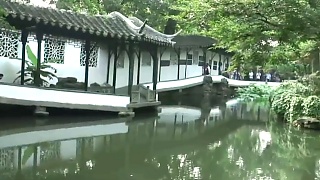
![Fun teacher . . . [videogallery type=playlist id=PLneZiE_zP2-wKOn0bDZ1p5VEph5GvHbl7 c=3 num=50] Beginners' Chinese language](https://img.youtube.com/vi/gX3xCsoTbDs/mqdefault.jpg)

![How to pronounce the four tones and speak PinYin correctly. With Qing Xia . . . [videogallery type=playlist id=PLn996NprGoEI-rbWdpRlX-yuZoQ5ERZl2 columns=2] Learn to speak Chinese from zero](https://www.beijingbuzzz.com/b101.jpg)
